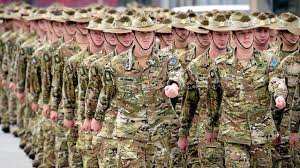
Anyone who has experienced transitioning out of a career in the military will understand that it can be an anxious time.
The civilian workforce can be far removed from the structure and regiment of service, with different management styles, organisational structures and physical work environments.
But the value veterans bring to organisations is universally recognised and the reason many firms are going above and beyond to support their transition into a new world of work.
Global real estate services firm, JLL, is one of them.
“Defence invests heavily in the training and development of their uniformed personnel. They have a unique insight into Defence capability and speak the language of the customer. Why would we not help create a strong defence industry chain by providing veterans and their partners with Defence-associated roles in their post-uniformed career?,” says Geoff Camp, defence vertical lead, JLL.
JLL runs an Australian veteran engagement program which considers a differentiator its ‘for veterans by veterans’ approach, with a committee of veteran employees steering the program.
Committee member Madeleine Taylor is a former Australian Army Officer Cadet and the daughter of a Lance Corporal in the Australian Defence Force (ADF). She was medically retired from services in 2009 and now leads a team of people to deliver facilities management, leasing, and capital projects for federal government departments.
“You are looking for a culture you can understand and fit into and have a meaningful career that’s going to go somewhere,” Taylor says.
Speaking about the program’s aim to offer veterans and their partners from all ranks and services a successful civilian career as they transition out of the military, she says: “We’ve set it up to be supportive in every sense, including providing recruits a network of mentors and the ability to work with other veterans who have been through the same experience.”
Clear career pathways mean even entry-level employees could become professional project managers or facilities managers within two years.
Another important aspect is that its talent acquisition and hiring managers are trained in understanding military ranks and roles, which means they can ask interview questions that draw out transferable skills and know how to translate military experience into job requirements.
Leadership and loyalty
Due to the nature of their military training, the strength of veterans can often be found in leadership and big-picture thinking.
“Veterans are used to working in a structured way with discipline and process, and large organisations can have similarities to the military in terms of size and complexity,” says Trent Morrisey, account director at JLL for its contract servicing commonwealth government departments under the Whole of Australian Government. “There is the chance to feel part of something bigger.”
Morrissey served in the Australian Army for 11 years before transitioning out in 2008. His sentiment echoes Australian Defence Minister Matt Keogh, who acknowledged to parliament in November the contribution of veterans and their families to the Australian workforce.
“Veterans bring to the civilian workspace so many of the skills they have learned in their time in the ADF – leadership, teamwork, loyalty, agility, discipline and the ability to work under pressure,” he said.
“The government knows just how important a good transition is for a veteran to ensure good outcomes following their military service, a big part of that is getting into meaningful work.”
For Morrissey, carefully researching options and planning their transition into a civilian role is the best thing a veteran can do ahead of moving out of the force.
“Be patient, get your foot in the door and don’t be too hard on yourself. Have confidence in your abilities but also be prepared to step sideways,” he says.
Untapped workforce
Around 6,000 Australians leave the Defence Force each year and with that, a corresponding cohort of Defence spouses, according to Australia’s Department of Veterans’ Affairs.
In a tight skills market, this is a huge untapped workforce, members of which bring significant transferrable skills and world-class training.
“Veteran’s families bring not only their professionalism, planning and management skills to the workforce, they also bring the ability to work autonomously and in highly variable environments – all critical skills in the modern economy, all in demand by employers today,” Minister Keogh said in his parliamentary address.
It is an opportunity not lost on JLL, whose veterans program also includes support and jobs for partners and families. JLL has re-located roles to allow partners or family members to continue in their career when their serving relative is posted or deployed.
And with around 200 job openings every day across all disciplines, the size and complexity of an organisation like JLL means there are ample opportunities.
Defence spouse and JLL property manager Natasha Wilkinson says she has always found it difficult to explain in job interviews her multiple relocations around Australia.
“Non-Defence employers just didn’t seem to understand the posting cycle and how much it can impact spouses, partners and families,” she says.
“When my husband transferred from active service to Reserves, and we moved back to Perth from Darwin to be closer to family, JLL made it easy to transfer within the company.
“With the family upheaval that is usually associated with new postings, it was comforting that the stress of finding a new job was one less thing to worry about.”
Source: Defence Connect
